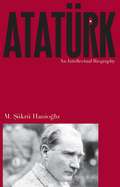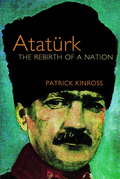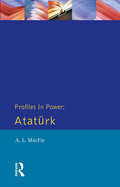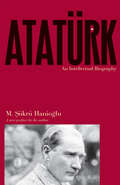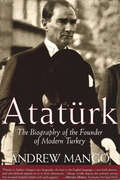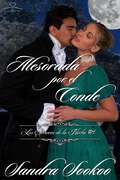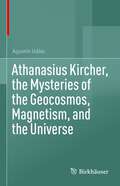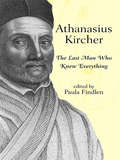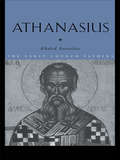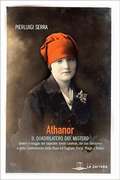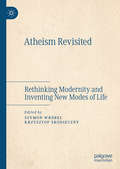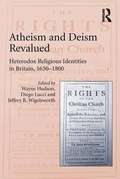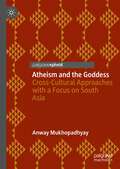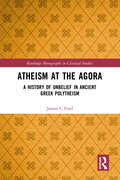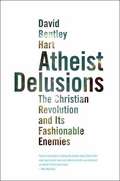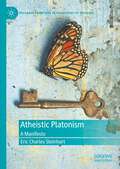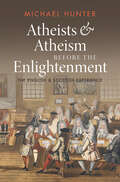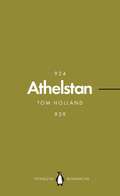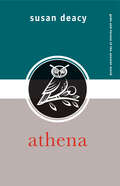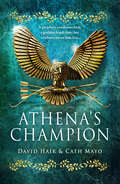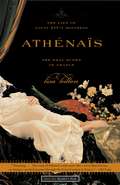- Table View
- List View
Ataturk
by M. Sukru HaniogluWhen Mustafa Kemal Atatürk became the first president of Turkey in 1923, he set about transforming his country into a secular republic where nationalism sanctified by science--and by the personality cult Atatürk created around himself--would reign supreme as the new religion. This book provides the first in-depth look at the intellectual life of the Turkish Republic's founder. In doing so, it frames him within the historical context of the turbulent age in which he lived, and explores the uneasy transition from the late Ottoman imperial order to the modern Turkish state through his life and ideas. Shedding light on one of the most complex and enigmatic statesmen of the modern era, M. Sükrü Hanioglu takes readers from Atatürk's youth as a Muslim boy in the volatile ethnic cauldron of Macedonia, to his education in nonreligious and military schools, to his embrace of Turkish nationalism and the modernizing Young Turks movement. Who was this figure who sought glory as an ambitious young officer in World War I, defied the victorious Allies intent on partitioning the Turkish heartland, and defeated the last sultan? Hanioglu charts Atatürk's intellectual and ideological development at every stage of his life, demonstrating how he was profoundly influenced by the new ideas that were circulating in the sprawling Ottoman realm. He shows how Atatürk drew on a unique mix of scientism, materialism, social Darwinism, positivism, and other theories to fashion a grand utopian framework on which to build his new nation.
Ataturk
by Patrick KinrossThe definitive biography of the father of modern Turkey, a powerful figure in the still-unfolding drama of the Middle East.With the collapse of the Ottoman Empire after the First World War came the emergence of new nations, chief among them Turkey itself. It was the creation of one man, the soldier-statesman Mustafa Kemal, who dragged his country from the Middle Ages to the twentieth century, and in defeating Western imperialists inspired 'the cause of the East'. Lord Kinross writes of the intrigues of empires, the brutalities of civil war, personal courage - showing us Ataturk, the incarnation of glory - as well as of Kemal's youthful ambition, and his problems with his wife.
Ataturk
by Patrick KinrossThe definitive biography of the father of modern Turkey, a powerful figure in the still-unfolding drama of the Middle East.With the collapse of the Ottoman Empire after the First World War came the emergence of new nations, chief among them Turkey itself. It was the creation of one man, the soldier-statesman Mustafa Kemal, who dragged his country from the Middle Ages to the twentieth century, and in defeating Western imperialists inspired 'the cause of the East'. Lord Kinross writes of the intrigues of empires, the brutalities of civil war, personal courage - showing us Ataturk, the incarnation of glory - as well as of Kemal's youthful ambition, and his problems with his wife.
Ataturk (Profiles In Power)
by Alexander Lyon MacfieThis concise account of the life and career of Mustafa Kemal Atatürk (1881--1938), the formidable "founder of modern Turkey", offers a substantial revaluation of a key figure in modern history, and also an introduction to the Turkish republic itself. It is a timely study with Turkey again at the centre of international attention, as Islamic fundamentalists challenge many of Atatürk's westernising and secularizing reforms, and as the regional aftershocks of the Soviet collapse reopen profound questions about Turkey's nature, role and relationships Atatürk had sought to settle for good.
Ataturk: An Intellectual Biography
by M. Şükrü HanioğluWhen Mustafa Kemal Atatürk became the first president of Turkey in 1923, he set about transforming his country into a secular republic where nationalism sanctified by science--and by the personality cult Atatürk created around himself--would reign supreme as the new religion. This book provides the first in-depth look at the intellectual life of the Turkish Republic's founder. In doing so, it frames him within the historical context of the turbulent age in which he lived, and explores the uneasy transition from the late Ottoman imperial order to the modern Turkish state through his life and ideas. Shedding light on one of the most complex and enigmatic statesmen of the modern era, M. Sükrü Hanioglu takes readers from Atatürk's youth as a Muslim boy in the volatile ethnic cauldron of Macedonia, to his education in nonreligious and military schools, to his embrace of Turkish nationalism and the modernizing Young Turks movement. Who was this figure who sought glory as an ambitious young officer in World War I, defied the victorious Allies intent on partitioning the Turkish heartland, and defeated the last sultan? Hanioglu charts Atatürk's intellectual and ideological development at every stage of his life, demonstrating how he was profoundly influenced by the new ideas that were circulating in the sprawling Ottoman realm. He shows how Atatürk drew on a unique mix of scientism, materialism, social Darwinism, positivism, and other theories to fashion a grand utopian framework on which to build his new nation.Now with a new preface, this book provides the first in-depth look at the intellectual life of the Turkish Republic's founder.
Atatürk in the Nazi Imagination
by Stefan IhrigEarly in his career, Hitler took inspiration from Mussolini--this fact is widely known. But an equally important role model for Hitler has been neglected: Atatürk, the founder of modern Turkey, who inspired Hitler to remake Germany along nationalist, secular, totalitarian, and ethnically exclusive lines. Stefan Ihrig tells this compelling story.
Atatürk: The Biography of the Founder of Modern Turkey
by Andrew MangoA “superlative [and] exhaustively researched” biography of “one of the most complex and controversial figures in twentieth-century world history” (Library Journal).Mustafa Kemal Atatürk was virtually unknown until 1919, when he took the lead in thwarting the victorious Allies’ plan to partition the Turkish core of the Ottoman Empire. He divided the Allies, defeated the last Sultan, and secured the territory of the Turkish national state, becoming the first president of the new republic in 1923, fast creating his own legend. This revealing portrait of Atatürk throws light on matters of great importance today—resurgent nationalism, religious fundamentalism, and the reality of democracy.“One of the world’s most respected specialists on Turkey.” —The New York Times“Mango gives this man, one of the least-known nation-builders of the last century, full treatment, from his earliest days to his ascension to power and his death, from cirrhosis at the age of 57. Few leaders have so modernized an ancient society, instituting radical changes in dress, religion, government, education—even the alphabet . . . Mango’s admiration for Ataturk doesn’t keep him from displaying the dictator’s arrogance, ruthlessness and authoritarianism; his Turkish expertise enables him to flesh out Ataturk’s complex life via sources he translated himself . . . a rounded, finely detailed portrait.” —Publishers Weekly“Thanks to Andrew Mango’s new biography, the best in the English language, a man both demonized and idolized appears to us in three dimensions.” —The Washington Post “A superb biography.” —Dallas Morning News“The best concise account I have ever seen of the decline of the Ottoman Empire. The narrative is gripping.” —Geoffrey Lewis, author of Modern Turkey
Ateek Ka Vartmaan
by Amartya Sen"The aim of this book is to inspect the explanation of Indian history given by Nationalists. The book's objective is an historical study and interpretation of scientific method in the study of Indian history and to awake the need of the utility to use its significant highlights.
Atesorada por el Conde: Los Señores de la Noche #4 (Los Señores de la Noche #4)
by Sandra SookooEstá atormentado por la culpa y los recuerdos, pero no puede olvidar... Evan Michael Sedgewyck, noveno conde de Coventry, está condenado a caminar por el mundo como un ser mitad-hombre, mitad-dragón, pero son sus acciones las que han causado su propio infierno personal. Dejando a un lado su mitad bestial, es viudo desde hace siete años, y en el momento en que decide asistir a un baile y tal vez volver a entrar en el Mercado Matrimonial, tropieza con una mujer a la que creía muerta: su esposa. Sin embargo, la ira que arrastra no disminuye. Busca respuestas, pero no recuerda nada... La señorita Damaris Sheffield -Victoria- está deseando ocupar su próximo puesto remunerado como institutriz, pero cuando un apuesto desconocido la aparta en un baile de máscaras, la llama por el nombre de otra mujer y la besa profundamente, empieza a hacerse preguntas. Tras rechazarlo y negar sus afirmaciones, descubre que es la esposa del conde, que tiene un hijo pequeño y que ha estado desaparecida durante años. El hecho de saber esto no alivia en absoluto sus ataques de ansiedad. Encontrar el amor por segunda vez para salvar su matrimonio... Cuando Evan y Victoria se enfrentan durante un nuevo periodo de noviazgo, ambos se ven obligados a ahondar en secretos de su pasado y a enfrentarse a viejos miedos. La pasión entre ellos crece, trayendo aceptación y comprensión, pero sólo el amor profundo y duradero puede arreglar lo que está roto. Tendrán que derrotar a una sorprendente amenaza y luchar por ser felices para siempre... si creen que el romance vale la pena para curar el dolor.
Athanasius Kircher, the Mysteries of the Geocosmos, Magnetism, and the Universe
by Agustín UdíasAthanasius Kircher, the eminent 17th-century German Jesuit professor of mathematics at the Roman College emerges as a captivating figure within the pages of this monograph by Agustín Udías. Aptly deemed 'the man who knew everything,' Kircher's thirty-two comprehensive works, spanning an array of subjects, provide a unique lens into his visionary perspectives. This book delves into three selected works where Kircher unveils his conceptualization of the Earth, termed the 'Geocosmos,' treated magnetism as a cosmic and spiritual force, and embarks on a cosmic exploration from Earth to the stars. From his groundbreaking speculations on the Earth's interior, attributing earthquakes and volcanoes to intricate channels of air, water, and fire, to his cosmic journey accompanied by the ethereal spirit Cosmiel, Kircher's enduring allure persists. Despite variance from contemporary knowledge, situated at the beginning of modern science, Kircher's proposals of the structure of the Earth’s interior, cosmic magnetic theories, and space journey to the stars offer a compelling glimpse into the intellectual landscape of a bygone era, making this book an essential exploration for scholars seeking a nuanced understanding of Kircher's profound influence.
Athanasius Kircher: The Last Man Who Knew Everything
by Paula FindlenFirst published in 2004. Routledge is an imprint of Taylor & Francis, an informa company.
Athanasius Kircher: The Last Man Who Knew Everything
by Paula FindlenFirst published in 2004.Athanasius Kircher (1602-1680) -- German Jesuit, occultist, polymath - was one of most curious figures in the history of science. He dabbled in all the mysteries of his time: the heavenly bodies, sound amplification, museology, botany, Asian languages, the pyramids of Egypt -- almost anything incompletely understood. Kircher coined the term electromagnetism, printed Sanskrit for the first time in a Western book, and built a famous museum collection. His wild, beautifully illustrated books are sometimes visionary, frequently wrong, and yet compelling documents in the history of ideas. They are being rediscovered in our own time. This volume contains new essays on Kircher and his world by leading historians and historians of science, including Stephen Jay Gould, Ingrid Rowland, Anthony Grafton, Daniel Stoltzenberg, Paula Findlen, and Barbara Stafford.-
Athanasius: The Coherence Of His Thought (The Early Church Fathers)
by Khaled AnatoliosThis book presents the fundamental elements of Athanasius' response to the central questions of the identity of Jesus and the nature of his relationship with God. Providing a useful introduction on his life and work, the book focuses on the tumultuous doctrinal controversies of the day in which he was a central figure. Key selections from his writings, newly translated, have all been chosen with a view to presenting the rationale for Athanasius' fundamental theological positions: the divinity and humanity of Christ, human redemption, the divinity and work of the Holy Spirit, the logic of Christian worship, and the scriptural basis for the doctrinal formulations of the Council of Nicaea. Students of history and classical studies, and even students of religious studies will find this an essential part of their course reading.
Athanor El cuadrilatero del misterio
by Bruno Landis Pierluigi SerraEl omicidio del capitán Looman, en el puerto de Cagliari, es una de las piezas de un complicado mosaico que hace de escenario a la búsqueda de un misterioso objeto, físico o quizás no material, peleado por dos cofradías en lucha secular por su posesión. La búsqueda de los rastros del pasado, y el viaje entendido como camino no solamente material, se vuelven el "fil rouge" que une los acontecimientos narrados en esta novela histórica. Personajes contemporáneos y del pasado,en planos temporales separados y sin embargo misteriosamente conectados, se encuentran el las distintas etapas de un recorrido que presenta todas las características del camino iniciático. Una vía marcada en los ánimos y en los mapas de Europa, donde amor, caballería medieval, venganza y ocultismo juegan en el antiguo enígma escondido en el Libro del misterio.
Atheism Revisited: Rethinking Modernity and Inventing New Modes of Life
by Szymon Wróbel Krzysztof SkoniecznyAtheism Revisited is a collection of essays that explore the multifaceted nature of atheism. Starting from the notion that today’s atheism is shaped by the defining processes of Modernity—such as secularization and the breakup of science, philosophy, and theology—the first part of the book undertakes a thorough scrutiny of Modern atheisms, from Spinoza and Hobbes to Marx and Nietzsche. The second part of the book seeks to draw practical conclusions from this scrutiny and answer the questions: what is the state of atheism today? What is the role of an atheist in a world affected by religious fundamentalisms? What should the relationship between atheists and religious people look like? The wide scope of the book allows readers to see atheism as a central concern of many intellectual movements, from Marxism and French Theory to post-secularism and the reevaluation of Modernity, and to understand atheism as a focal point of the most important contemporary philosophical debates.
Atheism and Deism Revalued: Heterodox Religious Identities in Britain, 1650-1800
by Wayne Hudson Diego LucciGiven the central role played by religion in early-modern Britain, it is perhaps surprising that historians have not always paid close attention to the shifting and nuanced subtleties of terms used in religious controversies. In this collection particular attention is focussed upon two of the most contentious of these terms: ’atheism’ and ’deism’, terms that have shaped significant parts of the scholarship on the Enlightenment. This volume argues that in the seventeenth and eighteenth century atheism and deism involved fine distinctions that have not always been preserved by later scholars. The original deployment and usage of these terms were often more complicated than much of the historical scholarship suggests. Indeed, in much of the literature static definitions are often taken for granted, resulting in depictions of the past constructed upon anachronistic assumptions. Offering reassessments of the historical figures most associated with ’atheism’ and ’deism’ in early modern Britain, this collection opens the subject up for debate and shows how the new historiography of deism changes our understanding of heterodox religious identities in Britain from 1650 to 1800. It problematises the older view that individuals were atheist or deists in a straightforward sense and instead explores the plurality and flexibility of religious identities during this period. Drawing on the most recent scholarship, the volume enriches the debate about heterodoxy, offering new perspectives on a range of prominent figures and providing an overview of major changes in the field.
Atheism and the Goddess: Cross-Cultural Approaches with a Focus on South Asia
by Anway MukhopadhyayThis book seeks to explore the complex modes of interface between religion, atheism, and the Goddess in multicultural contexts. While atheism has often been seen as an interrogation of and a battle against God, the gender dimension of this discourse has not been sufficiently negotiated. Is the fight against God also a fight against the Goddess? Or is there something common between the ideological thrust of the battle against God the “Father” in atheism and the interrogation of the Divine Father in thealogy? Can the Goddess be seen as an entity radically different from the imperious transcendental that the atheists find embodied in God the Father? Or, can the Goddess be seen as “transcendental” as well as immanent, and hence subjected to the same atheist denial of transcendence to which God is subjected in non-theistic or anti-theistic arguments? With this volume, Anway Mukhopadhyay embarks on a difficult project of epistemologically, ideologically and even politically renegotiating and reorienting some of the fundamental issues involved in the discussions of and debates over atheism.
Atheism at the Agora: A History of Unbelief in Ancient Greek Polytheism (Routledge Monographs in Classical Studies)
by James C FordThis fresh, comprehensive study of ancient Greek atheism aims to dismantle the current consensus that atheism was ‘unthinkable’ in ancient Greece, demonstrating instead that atheism was not only thinkable but inextricably embedded in the Greek religious environment. Through careful analysis of a wide range of source material provided in modern English translation, and drawing on philosophy, theology, sociology, and other disciplines, Ford unpicks a two and a half thousand-year history of marginalisation, clearing the way for a new analysis. He lays out in clear terms the nature and form of ancient Greek atheism as the ancient Greeks conceived of it, through a series of themes and lenses. Topics such as religious socialisation, the interaction of atheist philosophy and theology, identity formation through alterity, and the use of atheism in scapegoating are considered not only in broad terms, using a synthesis of modern scholarship to mark out an overview in line with modern consensus, but also by drawing on the unique perspective of ancient atheism Ford is able to provide innovative theories about a range of subjects. Atheism at the Agora is of interest to students and scholars in Classics, particularly Greek religion and culture, as well as those studying atheism in other historical and contemporary areas, religious studies, philosophy, and theology.
Atheist Delusions: The Christian Revolution and Its Fashionable Enemies
by David Bentley HartTHIS BOOK IS IN NO SENSE an impartial work of history. Perfect detachment is impossible for even the soberest of historians, since the writing of history necessarily demands some sort of narrative of causes and effects, and is thus necessarily an act of interpretation, which by its nature can never be wholly free of prejudice. But I am not really a historian, in any event, and I do not even aspire to detachment. In what follows, my prejudices are transparent and unreserved, and my argument is in some respects willfully extreme (or so it might seem). I think it prudent to admit this from the outset, if only to avoid being accused later of having made some pretense of perfect objectivity or neutrality so as to lull the reader into a state of pliant credulity. What I have written is at most a "historical essay," at no point free of bias, and intended principally as an apologia for a particular understanding of the effect of Christianity upon the development of Western civilization.
Atheistic Platonism: A Manifesto (Palgrave Frontiers in Philosophy of Religion)
by Eric Charles SteinhartAtheistic Platonism is an alternative to both theism and nihilistic atheism. It shows how any jobs allegedly done by God are better done by impersonal Platonic objects. Without Platonic objects, atheism degenerates into an illogical nihilism. Atheistic Platonism instead provides reality with foundations that are eternal, necessary, rational, beautiful, and utterly mindless. It argues for a plenitude of mathematical objects, and an infinite plurality of possible universes. It provides mindless rational grounds for objective values, and for objective moral laws for the persons who evolve in universes. It defines a meaningful way of life, which facilitates self-improvement. Atheistic Platonists argue for computational theories of life after death. Atheistic Platonism includes a rich system of spiritual symbols. It values transformational practices and ecstatic experiences. Where atheisms based on materialism fail, atheisms based on Platonism succeed.
Atheists and Atheism before the Enlightenment: The English and Scottish Experience
by Michael HunterAnxiety about the threat of atheism was rampant in the early modern period, yet fully documented examples of openly expressed irreligious opinion are surprisingly rare. England and Scotland saw only a handful of such cases before 1750, and this book offers a detailed analysis of three of them. Thomas Aikenhead was executed for his atheistic opinions at Edinburgh in 1697; Tinkler Ducket was convicted of atheism by the Vice-Chancellor's court at the University of Cambridge in 1739; whereas Archibald Pitcairne's overtly atheist tract, Pitcairneana, though evidently compiled very early in the eighteenth century, was first published only in 2016. Drawing on these, and on the better-known apostacy of Christopher Marlowe and the Earl of Rochester, Michael Hunter argues that such atheists showed real 'assurance' in publicly promoting their views. This contrasts with the private doubts of Christian believers, and this book demonstrates that the two phenomena are quite distinct, even though they have sometimes been wrongly conflated.
Athelstan: The Making of England (Penguin Monarchs)
by Tom HollandThe formation of England occurred against the odds: an island divided into rival kingdoms, under savage assault from Viking hordes. But, after King Alfred ensured the survival of Wessex and his son Edward expanded it, his grandson Athelstan inherited the rule of both Mercia and Wessex, conquered Northumbria and was hailed as Rex totius Britanniae: 'King of the whole of Britain'.Tom Holland recounts this extraordinary story with relish and drama, transporting us back to a time of omens, raven harbingers and blood-red battlefields. As well as giving form to the figure of Athelstan - devout, shrewd, all too aware of the precarious nature of his power, especially in the north - he introduces the great figures of the age, including Alfred and his daughter Aethelflaed, 'Lady of the Mercians', who brought Athelstan up at the Mercian court. Making sense of the family rivalries and fractious conflicts of the Anglo-Saxon rulers, Holland shows us how a royal dynasty rescued their kingdom from near-oblivion and fashioned a nation that endures to this day.
Athena (Gods and Heroes of the Ancient World #Vol. 7)
by Susan DeacyIn this definitive assessment of the various representations and approaches to Athena, Susan Deacy does what no other has done before and brings all the aspects of this legendary figure into one, outstanding study. A survey of one of the most enduringly popular of ancient deities, the book introduces Athena’s myth, cult and reception, while directing the reader to detailed discussion as and when it is appropriate. Students will find it a great help in their studies, and for the general reader with an interest in the ancient world and for those from related disciplines such as literature, art history and religion, it provides a mine of information and insight into this fascinating classical figure.
Athena's Champion (Olympus Trilogy)
by David Hair Cath MayoGods and mortals collide in this spellbinding retelling of a legend from classic Greek mythology, the first in the epic Olympus Trilogy. A prophecy condemns him, a goddess binds him, but wisdom can set Odysseus free . . . Young Prince Odysseus is about to have his world torn apart. He has travelled to the oracle at Pytho to be anointed as heir to his island kingdom, but instead a terrible secret is revealed, one that tears down every pillar of his life and marks him out for death. Outcast by his family and on the run, Odysseus is offered sanctuary by Athena, goddess of wisdom, and thrust headfirst into the secret war between the gods. But can his wits, and his skill as a warrior, keep him ahead of their power games—and alive? &“If you like magic and mayhem wrapped around ancient historical legends, this cup of nectar has your name on it. Recommended.&” —Historical Novel Society &“A refreshing, modern take of Odysseus&’ story. It has humor and exciting action.&” —Book Rambler
Athenais: The Life of Louis XIV's Mistress, the Real Queen of France
by Lisa HiltonIn her superb new biography, Hilton chronicles the life of this extraordinary woman, known as "the real Queen of France," who reigned as official mistress to Louis XIV during the most glorious period of "the splendid century."
